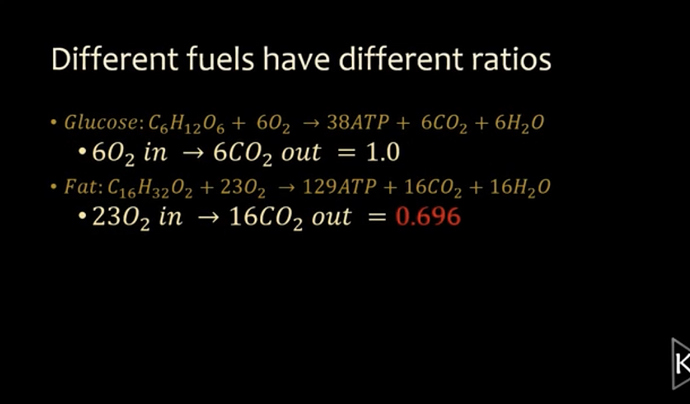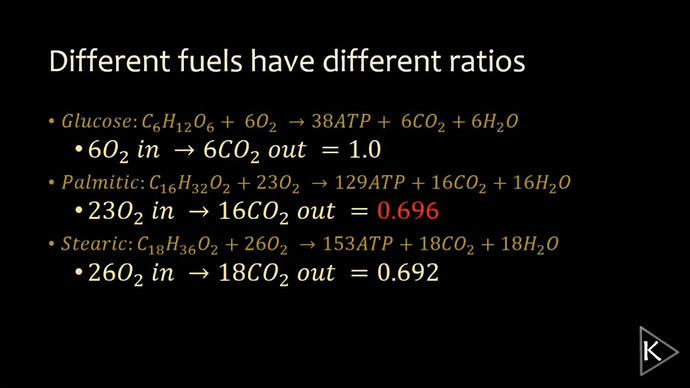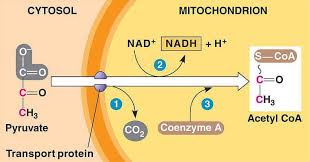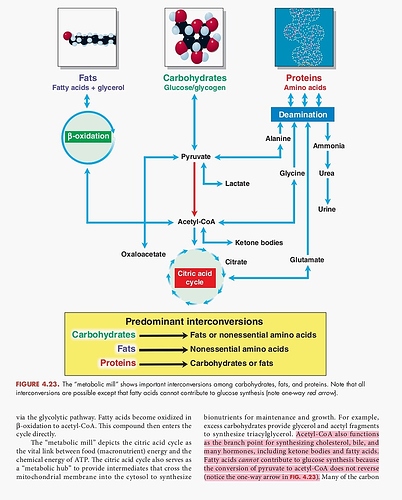The misunderstanding that continues to be repeated in the expression “a calorie is a calorie” appears to be exclusive reference to the first law of thermodynamics. The difficulty with this theoretical approach is that it is only part of the relevant physics and its relationship to biologic systems. The first law says that in any transformation the total energy in the system can be accounted for by the heat added to the system, the work done by the system on its environment and the change in energy content of all the components of the system. It is important to understand, however, that the first law does not say what the relative distribution between these effects will be for any process. In fact, the first law does not even allow us to say whether the process will occur at all. To understand the progress of a physical change it is necessary to understand the second law which introduces an entity known as the entropy, S, a measure of disorder in all processes. In all real (irreversible) processes, entropy increases, usually written ΔS > 0. The most common marker of increasing entropy is heat, although it is by no means the only evidence for increased entropy.
A Calorie is Not A Calorie - A Discussion of Thermodynamics
Don’t forget a fat-tissue battery to store some of that juice. But yes, the electrochemical basis of life is never far from us. Every living cell does its thing that way, and the brain is an electrochemical device that makes brainwaves.
I’d say it’s really people that need tweaking. For the timing of eating or the frequency of it, maybe that fixes things, maybe it doesn’t. If we’re talking about being “fat” or not, most of the world’s people are still okay, 60+% are not overweight, 87% are not obese - most people are doing all right whether they think about the energy balance or not.
I think it’s mathematical set theory at work, and that people start manifesting “facts” outside their realm of prevalence. Most people in the world do just fine with CICO, for example - they don’t even have to think about it. 
Humans have been around for a long time. It’s only in the last 0.1% or so of our existence (after the Industrial Revolution gave us farming machines) that diseases relating to too much food have really taken off. Time itself has cordoned off us latecoming people into a relatively very small subset - imagine a significant amount of the population among ‘common women and men’ needing to worry not about too little of something but about ‘too much.’
Exactly because if you can add and subtract a whole bunch of nothing it really does not matter anyways because jumbling numbers around thinking it means something when it is not real?
Take the Weir’s formula for example:
REE (kcal/day) = VO2 (3.941) + VCO2 (1.11)
1.44:
- VO2 = Oxygen burned
- VCO2= Carbon dioxide burned
15 litres of carbon dioxide exhaled = 94 calories of energy burned.
But where would you find a machine that could do such wonderful things this accurately for individual metabalomes? You most certainly won’t find it on an app or simply counting calories with your fingers?
How do you know who exhaled 15 liters of CO2?
Here Richard demonstrates different fuels have different out-puts ratios.
image link
“…More specifically, it could be said that fat burns in an oxaloacetate flame but, since you’re unable to replenish your oxaloacetate from glucose, then your internal metabolic conditions favour the formation of ketones (or ketone bodies) for energy (ATP) production. …” …More
Glucose===>Pyruvate===>Oxaloacetate Flame===>Enters the TCA cycle===>CO2-in-CO2-out===>Acetyl-CoA===>B-Oxidation===>Burns/Oxidizes Fatty Acids into ===>a Ketone Body…
Carbohydrates need to be broken down evenly with Dietary or Body Fat?
The Citric Acid Cycle has to work synergistically with the TCA cycle?
Fats burn in a carbohydrate flame? Sometimes, but it’s a very big and complex fire so that’s only a partial explanation. Fats also burn in lots of other ways that don’t involve carbohydrates or result in synthesis of carbohydrates. Yes, carbs from fat. As Eades says, it doesn’t make evolutionary sense that most of our stored energy is fat and that we can’t access it without first eating carbs. Humans would have gone extinct long ago if that were true. @atomicspacebunny I think you will find much food for thought:
the most weight you have directly gained is 20 grams.
At will, no. Changeable heat, yes.
No it is not. It is false that this is the exclusive source of energy for the brain, but it is completely true that this gluconeogenesis is used as an energy source for, among other organs, the brain.
It’s 3:44 AM. What am I doing necroing a thread?
Thanks for correcting me… I must have mis-interpreted what I was looking at…
She corrected Bunny’s statement, not yours.
In a couple years I’m going to come back to this thread and ask, “What is necroing?” 
I think there are both “yes” and “no” answers, and that once again there are larger contexts that apply.
Bunny copied and pasted that from a brief and somewhat general website, seven paragraphs below where it says, “simple carbohydrates are rapidly absorbed by the gut and enter the bloodstream very quickly. Candy bars are a great example! If you need a quick boost of energy unwrap a Snickers®!”
So, at the very least other things come to mind. 
We can agree that the body can use protein to make glucose, but when does it do it, and to what extent?
George Cahill, in the 1960s and 1970s, found that protein consumption and loss really “fell off a cliff” after just a few days in fasting humans - as I recall it quickly declined to around 15 grams per day. This may include some very small amounts used both for glucose/energy production and consequent to losses - the body is not perfectly able to recycle 100% of protein breakdown products. So we are losing some protein every day, just not very much at all.
Cahill held that ‘normal weight’ individuals (which in those days was already fairly lean) could fast for 2 months or so before things got dangerous, i.e. potentially mortal (obese people could, of course, go much longer). It was only during the latter part of this period where protein consumption substantially increased.
Studies of other mammals - dogs, rats, mice, etc., show this phenomenon. Beginning from a normal weight, it’s not until prolonged fasting has been done, and body weight has decreased by 35% or more, that protein use goes back up. At that point fat reserves are just about gone, and it’s “use protein or die.”
This is one of those thread with no right answer. There is no right answer because we are all different. That being said I have to ask. If your body needs 2000 cal to do all functions for the day and you give it that in the form that it is use to then why would it ever look to burn stored fat? This is the part I can never get my head around. Also please dont get hung up on the 2000 cal number. that was just a random number as I know that we all require different amounts of energy
@barns I think Bikman and others are onto how it happens with BAT and mitochondria decoupling. I posted a link above to Bikman’s presentation about decoupling.
That’s where the bio-availability of the ingested calories come into play…
Not much reason that it would. First and foremost, our bodies are trying to stay alive, and there’s a large evolutionary component of having backup energy storage - fat, in our case - to better the odds.
There needs to be a reason for it to burn stored fat.
@barns This is why:
Exactly. 
Can you imagine what we would look like if our main energy store was carbs or protein? 
Hello everyone,
I have tried to read as many comments as possible but this thread is quite long to say the least. Apologies if I have missed some of yours.
There are few things I note on the debate about CICO:
- CICO is the default position
- So if an alternative hypothesis has any slight setback, then we need to come back to the default position which is CICO
- Although CICO is the default position, people (proponents and critics) seem to endorse different definitions of CICO…which complicates the problem drastically
It appears that the reason why CICO is the default position (point 1 above) comes from an appeal to thermodynamics and, in particular, the first law of thermodynamics.
There is an insidious, semantic, problem with this narrative. By claiming that CICO is (solely) grounded in something as hardly evidenced as a more than century-old law of physics, it implicitly removes this privilege to any alternative hypothesis to understand what are the conditions for net fat loss to occur.
Many people here and quite famous researchers/doctors/nutritionists have had various takes at this “thermodynamic” argument and, ultimately, what they are saying is that thermodynamics is not the preserve of CICO…and that is perfectly correct in my opinion.
From a philosophy of science perspective I think CICO is default because it is what has been taught for decades. It is as simple as that. The fact that its definition is rather vague (point 3 above) also helps the CICO trademark to work in situations where some definitions of CICO would contradict both direct observation from people trying to lose weight and more in depth and systematic studies. Again, this is a quite common strategy in scientific practice (this is a quite standard way to avoid Popperian falsification).
Is there any feature of CICO that most of its proponents would agree with? I think there is at least one:
F1: CICO = fat loss can only occur under caloric deficit.
As some have pointed out in this discussion, measuring and/or predicting energy expenditure in a consistent manner is a very delicate thing to do and almost no-one has an accurate appreciation of their own BMR. So the whole idea of “caloric deficit” seems relatively impractical to me.
In practice, it seems to me that a judgment that an individual is in “real” caloric deficit or not comes as an a posteriori interpretation of an observed fat loss or gain through the lenses of CICO. So, I would boldly claim that more often than not coach-based or personal evidence of CICO relies on a circular argument.
Let’s assume though that someone actually eats less and, as a result, observes fat loss, does that support CICO at the expense of alternative hypothesis for fat loss? I don’t think so.
While it doesn’t contradict CICO (in the sense of F1), eating less (and we are not talking about lettuce here) also naturally decreases insulin levels which could enable more fat burning, especially when sustained for more than few days. So it doesn’t seem to contradict the link between insulin levels and fat loss either.
It is possible (this is an hypothesis of mine) that many fat loss results serve as “false positive evidence” for CICO while they could also be totally explained by alternative hormonal hypotheses.
The main point here is “what is driving fat loss”. If fat loss is primarily dictated by how hormones control fat storage and burning then there is the possibility that acting on these hormones alone with a targeted diet induces fat loss without changing the previously adopted calories-in and calories out (by “calories out” I mean the ones we can actively act on like physical work and/or exposure to cold sources). Lowering calories-in by reducing food intake may simply be one way by which one can act on these hormones. In that sense CICO becomes a secondary control measure for fat loss. This is a viewpoint that Dr Fung has put forward for example.
There is still a way to make CICO undefeated, even using definition F1 above. That is, again, by interpreting fat loss as indicating caloric deficit (even if some chamber says otherwise, it is still possible to state that the chamber is not measuring the right thing). In that case, it will be suggested that the dietary changes do affect hormones which will increase the BMR and, in fine, induce a caloric deficit. In this version of the story the primary control is caloric deficit and affecting hormones becomes a secondary control measure to achieve that goal.
I think the point is not to know which trademark is correct, because it will only be imposed by communication strategies and active lobbying, but rather to be aware of which tools at our disposal for fat loss.
Pioneers on the links between fat loss and hormones and dietary ways to achieve targeted hormonal changes for fat loss have compelled everyone in the nutritional, medical and fitness communities to be aware of the kind of food they advise people to eat to achieve their goals and it seems to me that both communities (CICO and others) mostly agree that what you eat is as important as the amount of what you eat.
Let’s appreciate that there is something they seem to agree on  .
.
I like your post, Fabien; there is a lot to think about. I would observe that here too, there are larger and smaller contexts at work, and that we are all just people talking to each other. We need to keep in mind what is desired.
As we grow up, there is a basic sense to the “default position” - “if you eat too much, you get fat,” etc. By now, the people reading this thread are older and (I would think universally) know that there is more to it than that.
On this forum, we are not all the same. We want different things - to uncover scientific and philosophical realities, to lose fat, to win arguments, etc., and mixtures of those. I take it as a given that different definitions of CICO are a problem. As a premise in this discussion, I also think we have to accept that we are all not approaching it the same way.
On this forum there is broad acceptance of alternate hypotheses, the ‘carbohydrate-insulin’ one being the best example. That does not mean that CICO isn’t grounded in physics. To reconcile those two things, I think we have to identify what’s desired on the part of individual speakers.
I may be missing your point, here, but I too would agree that thermodynamics is not the preserve of CICO. However, CICO is the preserve of thermodynamics (how could it be otherwise?).
The vagueness of CICO is due to human fallibility. We are not entirely rational, logical computers. Our focus can be wrong, and it can be changeable. Vast numbers of us begin by disregarding the ‘CO,’ for example.
Most of humanity doesn’t even think about CICO, and they are fine in doing so - they don’t need to lose weight. However, in our modern world there is a significant amount of people that do want/need to lose weight. The percentage of people on this forum or who began on this forum at higher-than-desired weight is higher yet. Again - perhaps I am missing your overall point, but I don’t think the issue on this forum is general considerations of CICO. I think it is the difference in our individual cases - what we desire and how we approach it.
That certainly makes physical, scientific sense. Yet a substantial number of forum arguments have started because this isn’t universally agreed to. And, some would say, “Well, I’m not a ‘proponent of CICO,’ anyway.”
Gross error is already in place if there would have to be “evidence” of CICO in that way. Acceptance of the physical reality of energy and matter should be a priori (where would we be if we denied it?). It does not matter how hard it may be to measure a given thing. Caloric deficit may seem “impractical,” but the benefits of the body removing part of its fat stores are undeniable, when fat/weight loss is desired.
Correct, but not because CICO is somehow “wrong,” there, it’s because there is not enough information given. It’s not even really a question of CICO being ‘supported’ there or not.
I think this detours around the importance of individual cases. Eating less can decrease insulin levels (it matters what is being eaten). There may be a link between insulin levels and fat loss - I don’t think anybody on this forum denies that for people with problem levels of insulin, for example, but then for some people it’s not much of a factor or a factor at all.
To me, it seems your view of CICO is necessarily incomplete. Nobody here is arguing that hormones cannot have effect nor cannot drive weight loss or gain. Nobody is arguing that CICO is the driver, alone. CICO can be both a cause and a result. When hormonal effects are driving things, then there is more to consider than merely the “in” and “out” - granted that this is true, but it’s still not unknowably complicated, i.e.
I don’t feel there is much debate about those things. There are also so many possible cases in that paragraph that no one conclusion (aside from general physical scientific truths) will apply. Let’s say it’s fat loss primarily dictated by hormones - okay, many of us will testify to that or realize that it may be the case. Or, fat loss primarily dictated by eating less, i.e. somebody fasted for a month. We have to narrow things down.
How could ‘some chamber’ measure the wrong thing? “Metabolization, storage, waste.” You stated fat loss - we know that is happening. Storage is declining. Waste is almost never a substantial concern - the body usually doesn’t waste much, here, and differences between waste amounts under hormonal variance - as I assume you are positing, such as lower insulin on a keto diet - are very unlikely to be a meaningful factor. Only metabolism remains.
Yet here too, this is not the source of forum disagreements.
It’s certainly a good thing, yes.  The portion of people who have benefited from that on this forum is extraordinarily high.
The portion of people who have benefited from that on this forum is extraordinarily high.
Specific to this forum, it’s not that there is a big problem with people appealing to the laws of thermodynamics. What starts arguments is people denying the laws of thermodynamics.
It goes far beyond this or similar threads - it goes to the entire forum and forums beyond. As Thomas Reid said, long ago,
“In every chain of reasoning, the evidence of the last conclusion can be no greater than that of the weakest link of the chain, whatever may be the strength of the rest.”




